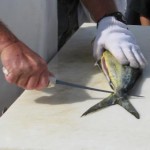
Buying fresh seafood locally is an excellent way to find high quality, healthy seafood, often at reduced prices. If you live near the water, local seafood may be plentiful, otherwise, you must rely on a reputable market.
Choosing Seafood
Sources of reliable information are usually important when searching for quality seafood. Don’t be afraid to ask questions before buying.
Seafood quality can vary considerably, depending on freshness and other factors. Look for clear natural looking eyes and firm flesh on most fish. Shellfish are sometimes sold live, which helps assure freshness.
Commercial Fishermen
In some locations, commercial fishermen, watermen, lobstermen, clammers, shrimpers, and other professionals sell seafood direct to consumers. The benefits are obvious; fresh seafood, right off the boat. Finding commercial fishermen that sell their catch off the boat can be an adventure at the least.
Seafood lovers will need to know a few tricks to accomplish this or be very lucky. First you must either know the area and the captain, or find a local person willing to share information in order to know when the boats will return, and which boats are likely to have seafood to sell.
Fresh seafood lovers might find fish, lobsters, crabs, clams, oysters, scallops, or other seafood this way. Although this is a long shot on finding seafood, it’s a great way to combine a weekend getaway with fun activities such as photography, boating or just talking to members of the seafood industry.
Seafood Wholesalers
Much of the seafood in the USA is harvested by independent commercial fishermen that sell their catch to wholesalers. The seafood is then sent to national or international markets, either fresh or frozen depending on the situation. Many seafood wholesalers accept walk-in customers and can supply fresh, high quality seafood in small or large quantities.
Usually a wholesale establishment can ice your purchase, and sometimes even provide a container. It is always best to know your supplier, bring your cooler and call ahead if possible.
A wholesale seafood dealer is more likely to have fish and shellfish that are not suitable to buy from the boat, such as swordfish, tuna, shark or other large fish that would be unavailable from the fisherman. Seafood wholesalers will also have cold storage, to keep products as fresh as possible.
Seafood Markets
For most people, a local seafood market or fish monger is the best bet. Seafood buyers may find a market near home, or while traveling. In either case, look for businesses with a good long term reputation, clean appearance, and friendly atmosphere. Unless you are minutes from home, bring a cooler and ice. Most seafood needs to be kept on ice or refrigeration from the moment it’s purchased.
The seafood market proprietor is often an excellent source of information. A good shopkeeper will explain the various fish, shellfish and other items in stock, advise you on quality, age, cooking tips and help pack the items for your trip home.
A seafood market might also have specialty cookware, recipe books, seasonings, and other items to accent your meal.In addition to fresh local products, many seafood markets will have high quality frozen seafood from all over the region.
Farmers Markets
In recent years, seafood has become much more common at farmers’ markets. In coastal areas, fresh-caught bay and ocean seafood may be available In inland areas, vendors may offer farm-raised fish, freshwater fish, frozen seafood from other regions, or other products.
Community Supported Fishery (CSF) Programs
Community supported fishery (CSF) programs, also known as seafood co-ops, are an alternative to conventional seafood sales.
CSF programs administer co-operative buying agreements in which members of a community buy seafood directly from the fisherman over a predetermined length of time.
CSF members (shareholders) pay a fee in advance, and in turn receive shares of seafood caught during the season.
More Information